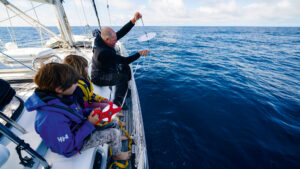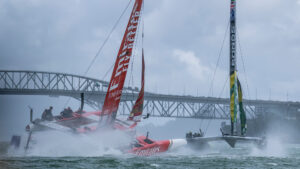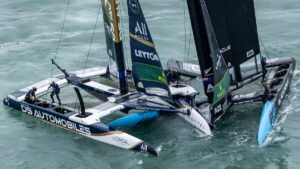Liveaboard cruisers Larissa Clark and Duncan Copeland on how sailors can get involved with ocean conservation and citizen science projects
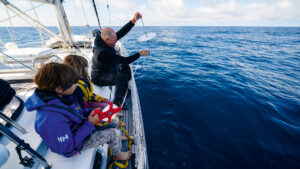
There is a fierce and surprisingly passionate debate unfolding on the deck of Freeranger, our 50ft Beneteau. The question at hand is which weight to use: the big one or the small one?
All around us, other boats are not wasting their time. It’s the first day of coho salmon season in the glassy waters of British Columbia, and everyone else is bobbing joyfully in the midday sun, hauling fish out of the sea with jubilant ease. Cries of “Fish on!” echo across the sound. The salmon are biting. The FOMO is real.
But we’re not here for the fish, and this isn’t a conversation about fishing tackle. We’re here for science. Citizen science, to be precise. And the debate is about a Secchi Disk – a simple white disk on a measuring tape – and our comic inability to make it behave.
Unfortunately, the current isn’t cooperating. Our Secchi Disk is meant to sink smoothly until it vanishes from sight, thereby allowing us to log the clarity of the water and contribute a tiny pixel of information to a planetary picture of ocean health. But instead, it’s being carried sideways like a drunk jellyfish, and everyone has a theory about how to fix it.
Our son, Eden, has observed all this with the detached cynicism of a seven-year-old boy. “We could just start fishing instead,” he suggests, clutching his lucky lure. “Then tell them how big our fish was. That’s data too.”
He’s not wrong, and we’ll do that later. But right now we’re determined to get this right.
This Secchi Disk reading is the first of many small contributions we plan to make on our voyage around the world — a grand experiment in turning family travel into something scientifically meaningful.
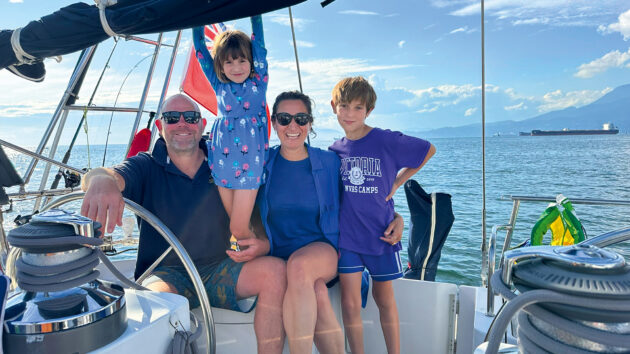
Larissa Clark, Duncan Copeland and family are doing their bit for ocean science
Citizen science
Fast forward 10 months, and we’re in the UN biosphere reserve at Fakarava Atoll, French Polynesia, where the Secchi Disk project has by now become so routine that our primary-aged kids lower the disk with practiced flair and log data into the app without adult intervention. It’s one of over a dozen projects we’ve taken part in since leaving Victoria, Canada, in July 2024.
At the beginning, it was all about adventure. To sail off into the big blue yonder. And yes, we wanted our kids to learn from the world, rather than just about it. To swim with sharks and taste fresh mangos and get unreasonably excited about sea cucumbers. But over our decade of planning, another idea started to take shape.
We’ve spent our careers at the sharp end of environmental justice, marine resource management and conservation communications. It became increasingly clear that we couldn’t just sail past the many challenges the ocean faces.
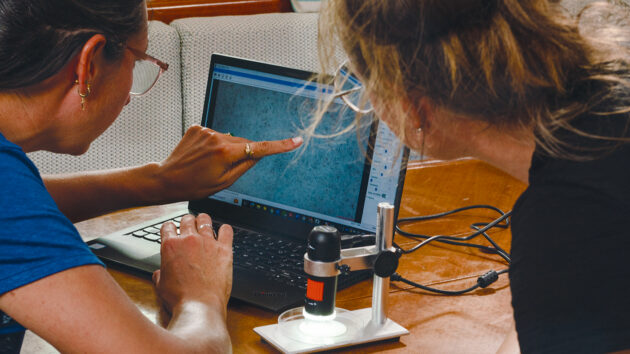
A small microscope on board brings home-schooling science lessons to life
Plastic pollution, acidification, overfishing, loss of biodiversity, sea temperature rises… Yet it’s also a place filled with solutions – or at least, the potential for them. But what’s needed is data, lots of it. So an idea slowly took shape: what if, instead of just observing the world as we sailed through it, we could do a little bit more. We wanted to journey with purpose and, if we could, encourage others to do the same.
Enter citizen science – a phrase that sounds like something dreamed up by an underfunded government initiative but is, in fact, a rather beautiful idea. At its core, it means regular people contributing to real science. In our case, cruisers.
Measuring, sampling, logging, photographing, submitting and analysing data – all helping researchers build scientific knowledge which will, says UNESCO, illuminate the path to reversing the decline in ocean health, conserving marine life, addressing ocean aspects of climate change and using the ocean sustainably to improve lives.
Article continues below…
What you need to know to sail across the Pacific
Coffee in hand, I gaze out from our cockpit across the flat lagoon of the palm-fringed coral atoll in Fakarava.…
Home schooling at sea: Top tips for tutoring your kids from 6 liveaboard sailors
For many, the opportunity to trade a bricks and mortar school for classes on deck or on the beach is…
Keen to help
Bluewater sailors are regularly in locations scientists can’t easily get to. As cruisers we’re often, quite literally, in a position to assist, and regularly sail, fish, anchor, snorkel, paddleboard, and putter about in biodiverse or far-flung places that researchers only dream of visiting.
Lots of sailors, we’ve discovered, would love to help – if only they knew how. We quickly found out when we started looking for projects that our family could get involved with, that it can be surprisingly difficult to find information on citizen science projects relevant to your region, area of interest, or circumstances.
We decided to do something about that. With the help of some incredible volunteers, we started collecting details of as many ocean-focussed citizen science projects as we could find. We established a small not-for-profit called Free Range Ocean. We built a website and created the Ocean Citizen Science Directory: a one-stop shop for curious ocean lovers looking to pitch in. From whale sighting apps or microplastics sampling to seaweed beach surveys, there is something for everyone.
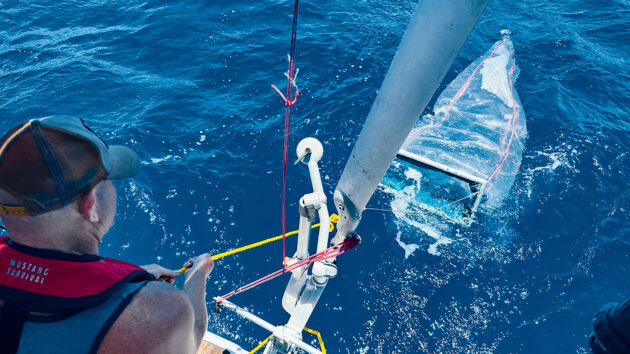
A Neuston Net survey aboard Freeranger resulted in a haul of fascinating marine
Over time, we’ve found that the easiest projects to get involved with are the ones that build on our interests and skillsets and what we’re already doing day to day. If you see a whale, fantastic: watch it, and then enter the data into one of the many projects that need it.
In British Columbia we logged sightings into the WhaleReport app, which adds to a database of over 330,000 observations that is used by universities, environmental organisations and conservation-research projects. The data is also used to alert commercial ships to whale locations to avoid collisions. We got an email thanking us for our ‘invaluable contribution’ which, frankly, made our week.
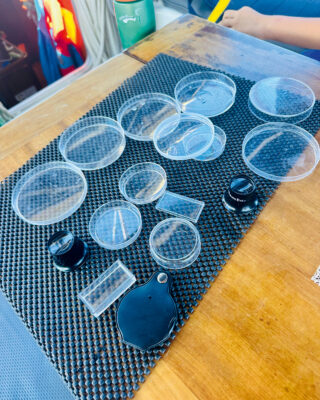
Marine life being carefully recorded to be shared with researchers
Netting data
On our Pacific crossing this March between Bahia Banderas in Mexico and Henderson Island in the Pitcairn Islands, we deployed a Neuston Net – a device used to sample surface biodiversity. The project is part of the Neuston Net Research Collective in collaboration with Dr Rebecca Helm and The International SeaKeepers Society.
This required more precise planning: receiving the net to an address in Mexico, storing it, waiting until we were far offshore in international waters, hoping for calm weather, slowing the boat to a crawl, and then towing the net for 30 minutes.
When hauled in it was teeming with strange and wondrous life: translucent shrimp, alien jellies, and even a Halobate, the only truly marine insects. The kids were beside themselves, and they weren’t the only ones. Science had never been so squishy or so thrilling. All the findings were carefully recorded to be shared with researchers.
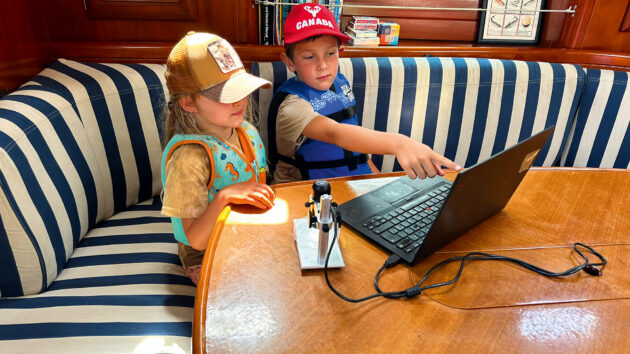
Eden (8) and Skye-Elizabeth (6) help out too
We now participate in around half a dozen citizen science projects on a regular basis, depending on where we are and what’s feasible. In the Directory, there are dozens more. Some require internet access, others just a notepad. Some want photos, others want actual samples.
A few are so low-effort that it feels like cheating. One simply requires you to plug a dongle into your depth sounder and collect depth data as part of a global effort to better map the seabed.
The ocean we need for the future isn’t going to restore itself. It’s going to take data, commitment, and a little curiosity from a whole lot of people. Whether you’re recording manta rays, scanning for seagrass, or just watching a white disk vanish quietly beneath the waves, you’re helping.
6 citizen science projects to get you started
WhaleReport App
What – Help rescuers, researchers, and mariners reduce vessel strikes on whales.
How – Report sightings into a handy app
Where – Canada, US, Mexico,
Contact – freerangeocean.org/projects/whale-alert
Secchi Disk Study
What: Help researchers understand the impact of climate change on phytoplankton
How: Use a simple scientific tool to map the ocean’s phytoplankton and submit your findings via a free app. Order one online or build your own.
Where: Global, all seas
Contact: freerangeocean.org/projects/secchi-disk-study
iNaturalist
What: Help researchers grow a global dataset of biodiversity observations
How: Share your observations via the website with a network of naturalists, scientists and biologists.
Where: Global, all seas
Contact: freerangeocean.org/projects/inaturalist
Seabed 2030
What: A global Citizen Science initiative to map the world’s oceans by 2030
How: Privately-owned vessels can share depth measurements from navigation instruments while out at sea
Where: Global, all seas
Contact: freerangeocean.org/projects/seabed2030
Neuston Net Research Collective
What: A project to conduct plankton surveys
How: Conduct survey-style transects by trawling a fine mesh net
Where: North Atlantic Ocean, North Pacific Ocean, South Pacific Ocean
Contact: freerangeocean.org/projects/neuston-net-research-collective
Big Seaweed Search
What: Learn more about Britain’s sealife
How: Take a 5m transect of UK shoreline, identify living seaweeds using the field key, send in photos and a recording form.
Where: United Kingdom
Contact: freerangeocean.org/projects/the-big-seaweed-search
 If you enjoyed this….
If you enjoyed this….
Yachting World is the world’s leading magazine for bluewater cruisers and offshore sailors. Every month we have inspirational adventures and practical features to help you realise your sailing dreams.Build your knowledge with a subscription delivered to your door. See our latest offers and save at least 30% off the cover price.
Note: We may earn a commission when you buy through links on our site, at no extra cost to you. This doesn’t affect our editorial independence.
The post The ocean citizen science being carried out on yachts appeared first on Yachting World.
